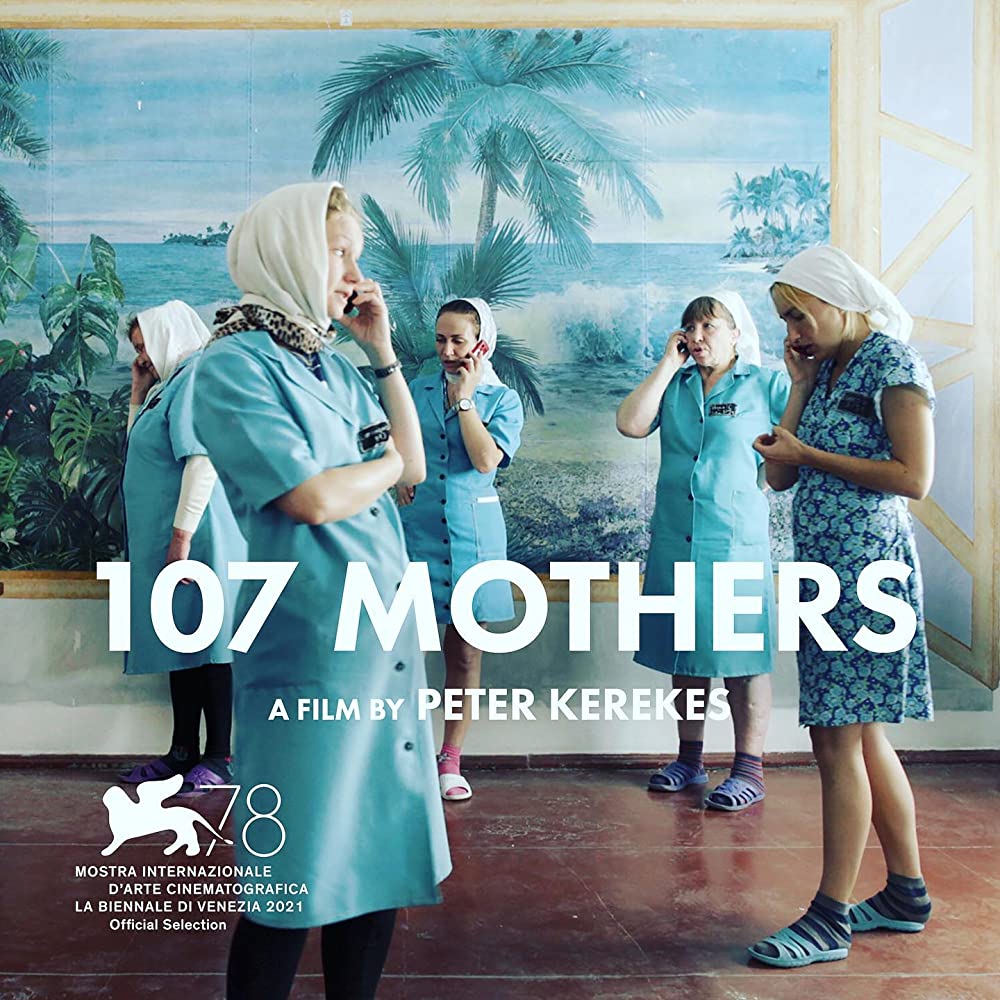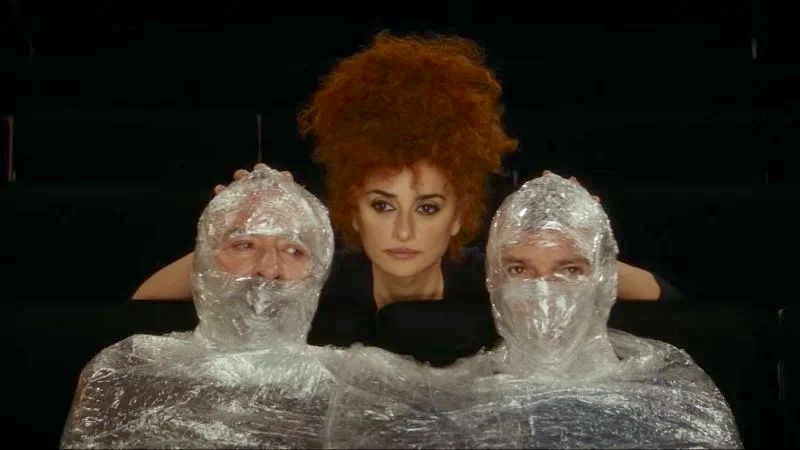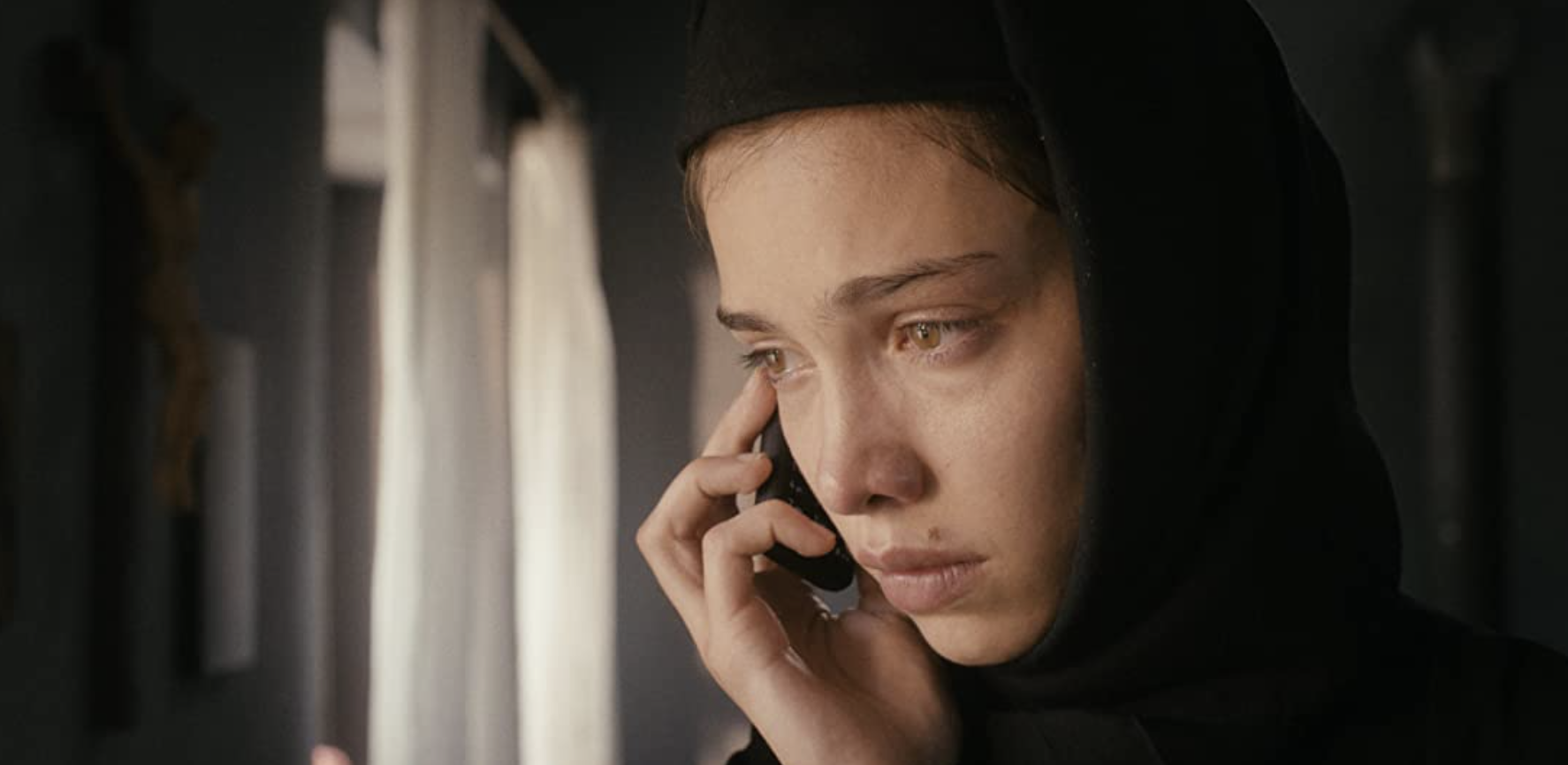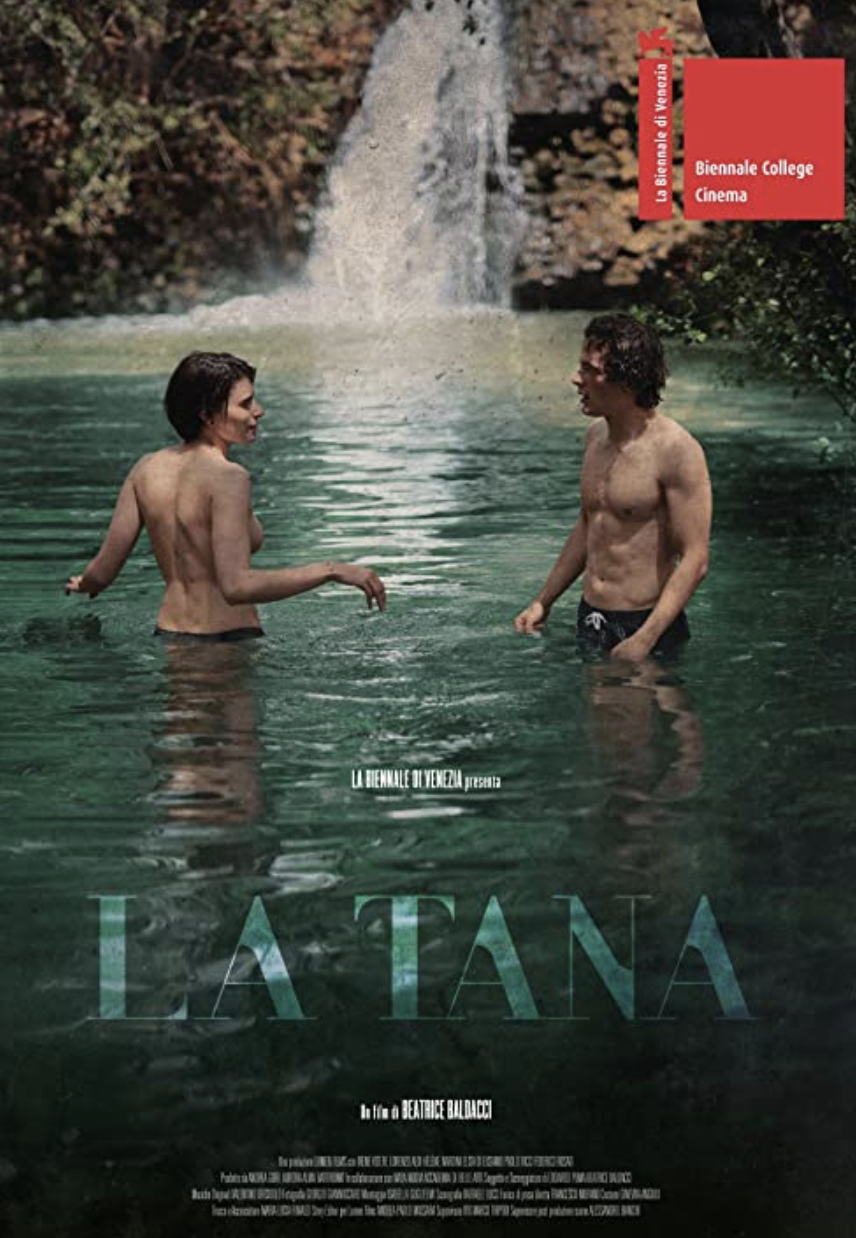Nathaniel in Venice: "Official Competition" and "107 Mothers" surprise
 Tuesday, September 7, 2021 at 11:00AM
Tuesday, September 7, 2021 at 11:00AM Nathaniel reporting from Venice, a smorgasbord of days 3 through ??? ... I've lost track of days. What is time?

107 Mothers (Péter Kerekes)
A ‘tough' movie doesn’t have to be hard to watch. 107 Mothers isn’t ‘easy’ in its characters or themes, but it’s a surprisingly gripping watch, even entertaining. For a few scenes in the beginning of 107 Mothers, a new film from a Slovakian director Peter Kerekes, it feels like you’ve stumbled into an unfeeling doc about a women’s prison for violent offenders. And, indeed, this narrative feature is based on real stories about a specific prison in Odessa, Ukraine and Kerekes usually does documentaries. The establishing scenes interview several of the inmates, all pregnant, about their crimes which usually involve murdering their boyfriend/husband or his lover. It’s a curiously incongruous feeling that settles in: how could such hard-eyed numb women muster enough passion to commit a “crime of passion"?
Some of the women don’t feel guilty and aren’t terribly sentimental about their condition, either, one of them admitting she bribed a guard to get pregnant because pregnant prisoners get early parole. Another plans to return to her husband, though she killed his girlfriend, and says she feels no remorse and would do it again. Another, played by Maryna Klimova, is tighter-lipped about her crime. Her stone-face doesn’t convey a lack of emotion so much as an overwhelming amount of it caged up lest any of it escape. She’s particularly fragile just underneath the eyes when it comes to her little boy. The babies of inmates stay in the prison for three years (though the mothers only see them a few hours a day). The central drama of the film is whether or not Maryna will be able to find a home for her son or if the orphanage will take him. The comic relief, which miraculously doesn’t detract from the overall tone but gives it a livelier texture, is the life of one of the wardens (played by Iryna Kiryazeva) we occasionally follow home. Her mother continually badgers her to have children and complains that she has a “manly” job and doesn't wear makeup or dress pretty. With the warden and the lead prisoner, who she struggles to understand and speak plain truths to, 107 Mothers gives us not one but two very compelling women, both concerned about the fate of the same toddler. It's my second favorite film of the fest and what a surprise! B+/A-

Official Competition (Mariano Cohn and Gaston Duprat)
Elisa already raved about this one so I'll just briefly state 'seconded' on all her points, especially the one about needing more comedies at festivals. Film festivals are wonderful if you love cinema but they invariably preference a certain type of film and man cannot live on slow crawl, deadly serious, dialogue iight arthouse films alone! Official Competition nails the first assignment of comedies: be funny!
Though it's fifteen minutes too long (the bane of modern comedies) I was laughing consistently from the very first scene when an old businessman (a hilarious supporting turn from José Luis Gómez) perplexes his assistant by abruptly deciding that he should produce a film, through to its many jokes about eccentric directors and egotistical actors to its very last joke about the way movie's end. One repeat joke about an actor's exercize involving calling out your own name had me in stitches. It's also fun to see Cruz and Banderas together in a non-Almodóvar picture! Non-film people probably aren't going to dig this but who cares about them, right?
Penélope Cruz is on fire in Venice giving two extremely different performances in two fine films. Kristen Stewart in Spencer or Olivia Colman in The Lost Daughter feel more likely for the Volpi Cup for Best Actress but Cruz wouldn't be a bad choice at all if the prize cites both of her competition films as a set. B+
 Miracle
Miracle
Miracle (Bogdan George Apetri) and La Tana (Beatrice Baldacci)
It’s funny the narrative tricks you notice when you see multiple movies in a row at a festival. These two films from Romania and Italy, respectively, are nothing at all alike but both share a tendency to mirror themselves, purposefully, in the back half to draw your attention to what you’ve already felt and witnessed in the first half. La Tana, which is a simple story of an Italian boy who falls for a wild but secretive girl next door to his summer home, does this with a particular shot near the beginning in which the boy notices the girls staring intently at him out of focus in the background. Later in the film the shot is reversed so it’s the girl watching the boy stare… then finally approach her in the foreground; the shot conveys a much different meaning the second time due to what has and hasn’t transpired between them. Miracle does its own mirroring more blatantly; in the first half we follow a novice as she leaves her convent for the city for a secretive purpose only to meet tragedy on her way home, while in the second a police detective, or rather the camera itself, retraces her steps, starting from home and also ends at the crime scene, which each location in the film getting a second look, and at least once in a very surprising way (I’d never spoil), revealing something quite unexpected.
 While La Tana is beautifully shot (Giorgio Giannoccaro on cinematography) with gorgeous camera subjects in the frequently shirtless pair of Lorenzo Aloi and Irene Veters, it unfortunately feels a bit like a short film extended to feature length. There are lots of repetitive scenes between the somewhat dim eager boy and the manipulative but sympathetic girl, who toys with the boy repeatedly and sometimes dangerously. Still it has fine moments including a magical realist denouement involving flowers and it’s also a major hair movie for follicular obsessed moviegoers between Lorenzo’s impossibly voluminous curls and Irene’s young-Rampling boyish bangs.
While La Tana is beautifully shot (Giorgio Giannoccaro on cinematography) with gorgeous camera subjects in the frequently shirtless pair of Lorenzo Aloi and Irene Veters, it unfortunately feels a bit like a short film extended to feature length. There are lots of repetitive scenes between the somewhat dim eager boy and the manipulative but sympathetic girl, who toys with the boy repeatedly and sometimes dangerously. Still it has fine moments including a magical realist denouement involving flowers and it’s also a major hair movie for follicular obsessed moviegoers between Lorenzo’s impossibly voluminous curls and Irene’s young-Rampling boyish bangs.
Both films are memorable particularly for their vivid hostility, which is another reason I’ve paired them mentally for this review. The girl is raging internally (if not expressively) in La Tana due to a terrible personal tragedy. In Miracle the characters are more articulate but are frequently hostile. The police inspector, who is in some ways the hero, is also a dishonest cop and a bully. He and to a lesser extent one supporting character are verbally disgusted by mentions of God and faith and religion. But Miracle with its final beat — which will read cheap and gimmicky to some and incredible to others (and somewhere in-between for this viewer) — suggests a kind of grace and mercy not in spite of the cruel world but because of it. Miracle: B; La Tana: B-/C+
Next up: Two more competition films Last Night in Soho and Mona Lisa and the Blood Moon.
More Venice coverage
- Elisa's Diary #1 Parallel Mothers and Power of the Dog
- Elisa's Diary #2 The Card Counter, Hand of God, The Lost Daughter
- Elisa's Diary #3 Spencer, A Plein Temps, Il Buco
- Eiisa's Diary #4 Sundown, Official Competition, etc...
- Elisa Extra Dune - full review
- Elisa's Diary #5 L'Evenement, Lost Illusions, Mona Lisa...
- Elisa's Diary #6 Reflection, Captain Volkonoff Escaped, Old Henry, etc...
- Nathaniel in Venice #1 Parallel Mothers
- Nathaniel in Venice #2 Power of the Dog, Madeleine Collins
- Nathaniel in Venice #3 Atlantide, Les Promesses, The Lost Daughter
- Nathaniel in Venice #4 107 Mothers, Miracle, etc...
- Nathaniel in Venice #5 Last Night in Soho, Mona Lisa and the Blood Moon
- Nathaneil in Venice #6 Catholic School, A Hole in the Fence, La Caja



Reader Comments (1)
Penélope Cruz is really, really becoming "due" for a Lead Actress Oscar already... I mean, two leading roles that are almost polar opposites? In drama AND comedy? In the same year?
If both films were English spoken... she would be a lock, this year for the nom, and one of the top contenders to win